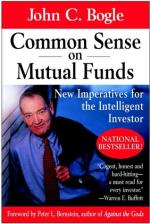Common Sense on Mutual Funds: New Imperatives for the Intelligent Investor, written by John Bogle, is a book educating investors about mutual funds, with a focus on the praise of index funds and the importance of having a long-term strategy.

Table of Contents
Overview of Common Sense on Mutual Funds
“Common Sense on Mutual Funds” is a book by John C. Bogle, the founder of Vanguard Group, one of the largest and most respected investment management companies in the world. The book is a comprehensive guide to understanding mutual funds and the principles of long-term investing.
Key Takeaways from Common Sense on Mutual Funds
It emphasizes the importance of low-cost, passive index fund investing as a sensible approach for most individual investors. Here’s a brief summary of the key points from the book:
- Index Investing: Bogle advocates for index investing, which involves investing in funds that track a market index, such as the S&P 500. He argues that actively managed funds often fail to consistently outperform the market over the long term due to higher fees and transaction costs.
- Cost Matters: Bogle emphasizes the impact of fees on investment returns. High fees can significantly erode potential gains. He recommends investing in low-cost index funds to minimize expenses and maximize returns.
- Long-Term Focus: Bogle encourages investors to adopt a long-term perspective. He believes that short-term market fluctuations are noise and that staying invested for the long haul is key to achieving financial success.
- Market Efficiency: Bogle discusses the efficient market hypothesis, which suggests that prices reflect all available information. This concept supports the idea that trying to beat the market consistently through active management is difficult.
- Diversification: Diversification across various asset classes is crucial to managing risk. Bogle recommends creating a balanced portfolio that includes a mix of domestic and international stocks, bonds, and other asset types.
- Behavioral Considerations: Bogle acknowledges that emotions can drive investors to make irrational decisions. He advises investors to remain disciplined and avoid making impulsive choices based on market trends.
- Active vs. Passive: Bogle argues that the majority of investors are better off with passive index funds rather than actively managed funds. He cites data showing that active funds tend to underperform their benchmarks after accounting for fees.
- Mutual Fund Industry: Bogle critiques aspects of the mutual fund industry, including excessive fees, turnover, and marketing practices that prioritize short-term performance. He believes that the industry should focus more on serving the interests of investors.
- Investor Education: Bogle encourages investors to educate themselves about the principles of investing and to make informed decisions. He believes that understanding the basics of finance is empowering.
- Simplicity: Bogle advocates for simplicity in investing. He believes that a straightforward approach based on index funds aligns well with the principles of long-term investing and minimizes unnecessary complexity.

How Relevant is the Book today?
Published in the year 1999 you might thing this book is not up-to-date. And indeed, when it comes to bitcoin and inflation, the book may be out dated.
However, many of the principles explained in the book are timeless. In fact, the core tenets of education, low time preference and simplicity are as important today as they were back in the days.
Since its release, it has received high accolades in the investment community. It has become a bestseller and is considered a “classic”. ConsumerAffairs.com rated it on its “15 Business Books That Could Actually Help Make You Rich” list. Despite it being aimed at American audiences, the British newspaper The Independent stated “there is nothing in it that does not apply in some measure to the UK fund industry.”
“Common Sense on Mutual Funds” serves as a foundational resource for investors seeking a prudent and straightforward approach to building wealth over time. Bogle’s ideas have had a profound influence on the investment industry and have helped shape the growth of index fund investing.









